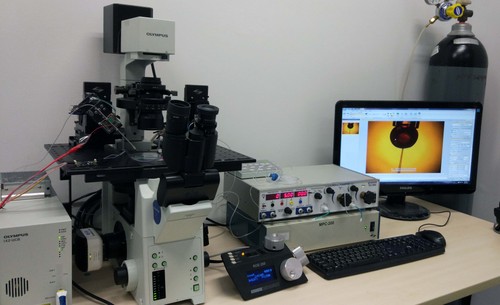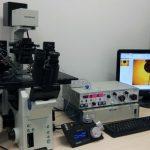 UM’s research project titled ‘Force-Sensing Automated Micromanipulation System
UM’s research project titled ‘Force-Sensing Automated Micromanipulation System
The University of Macau (UM) has achieved another breakthrough in scientific research. In a latest research project from the Department of Electromechanical Engineering, Faculty of Science and Technology (FST), University of Macau (UM), titled ‘Force-Sensing Automated Micromanipulation System’, force-sensing microinjectors and microgrippers have been developed towards automated operation on a micro and nanometer scale. The invented equipment enables a high survival rate for the injected cell as the cells suffer from minimum force during the injection process. The equipment will also produce more consistent and reliable results than skilled manual operation, and can significantly reduce the workload of, and dependence on the experience of, human operators. The project has been recommended for the Technological Invention Award (Second Prize) of the 2018 Macao Science and Technology Awards.
The research project was led by Xu Qingsong, an associate professor from the FST. The automated micromanipulation systems refer to robotic devices that can manipulate tiny objects automatically on a micro/nanometre scale. They are demanding and peering devices for modern precision engineering applications, including micro/nano manufacturing, biomedical engineering, and IC packaging. In line with the development trend of robotics and biomedical science and technology, this project has achieved technological innovations and breakthroughs in micromanipulation robotics, leading to new and extremely attractive application modes. As a frontier microinjection device, the invented force-sensing microinjector enables significant improvement on the consistency and viability of the injected cells and will cater to the growing demand for manipulating living cells in biomedical engineering. Meanwhile, novel intelligent robust precision motion control and hybrid position/force control algorithms have been invented to improve manipulation accuracy and speed. The newly developed systems have a lower cost of hardware compared to existing commercial products.
Prof Xu is a technical editor of IEEE/ASME Transactions on Mechatronics and an associate editor of several other journals. He has published three monographs and over 240 papers in international journals and at international conferences, and has received nine patents in China and the United States. According to the citation report of Web of Science from Clarivate Analytics, his H-index is 31, with a citation frequency of over 2700. Prof Xu’s main research interests include micro/nano-mechatronics and systems, robotics and automation, smart materials and structures, and intelligent control.
View gallery


